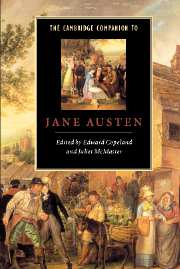Book contents
- Frontmatter
- 1 Chronology of Jane Austen's life
- 2 The professional woman writer
- 3 Northanger Abbey, Sense and Sensibility, Pride and Prejudice
- 4 Mansfield Park, Emma, Persuasion
- 5 The short fiction
- 6 The letters
- 7 Class
- 8 Money
- 9 Religion and politics
- 10 Style
- 11 Jane Austen and literary traditions
- 12 Austen cults and cultures
- 13 Further reading
- Index
11 - Jane Austen and literary traditions
Published online by Cambridge University Press: 28 May 2006
- Frontmatter
- 1 Chronology of Jane Austen's life
- 2 The professional woman writer
- 3 Northanger Abbey, Sense and Sensibility, Pride and Prejudice
- 4 Mansfield Park, Emma, Persuasion
- 5 The short fiction
- 6 The letters
- 7 Class
- 8 Money
- 9 Religion and politics
- 10 Style
- 11 Jane Austen and literary traditions
- 12 Austen cults and cultures
- 13 Further reading
- Index
Summary
Jane Austen inherited no obvious, no precisely defined tradition: not the classical canon which her brothers studied at school, not (like so many of her literary granddaughters) the canon as studied for a B.A. in English literature; not the full sweep of her predecessors in English fiction, many of whom remained unknown to her; not the intellectual framework offered by any regular course of study. 'Her reading was very extensive in history and belles lettres' (NA, P7). But it was desultory. She was never in a position, even had she wished it, to work through the kind of subject-bibliography which Emma is always drawing up; instead, she was dependent on titles which happened to come her way.
What came her way was by no means negligible. She was luckier than some of her heroines: Marianne Dashwood, who thinks her family library 'too well known to me' to provide 'anything beyond mere amusement' (SS 343), or Catherine Morland, who says, 'new books do not fall in our way' (NA 41). Austen's first library, her father's, ran to more than 500 books. Though her school experience was brief and insignificant, most of the usual school books were accessible at home. Most importantly, the whole family were avid book-borrowers and book-exchangers. Chawton, scene of her most sustained and productive period of writing, had a better reading group than she had found at Steventon and Manydown, as she was at pains to point out.
- Type
- Chapter
- Information
- The Cambridge Companion to Jane Austen , pp. 189 - 210Publisher: Cambridge University PressPrint publication year: 1997
- 6
- Cited by

